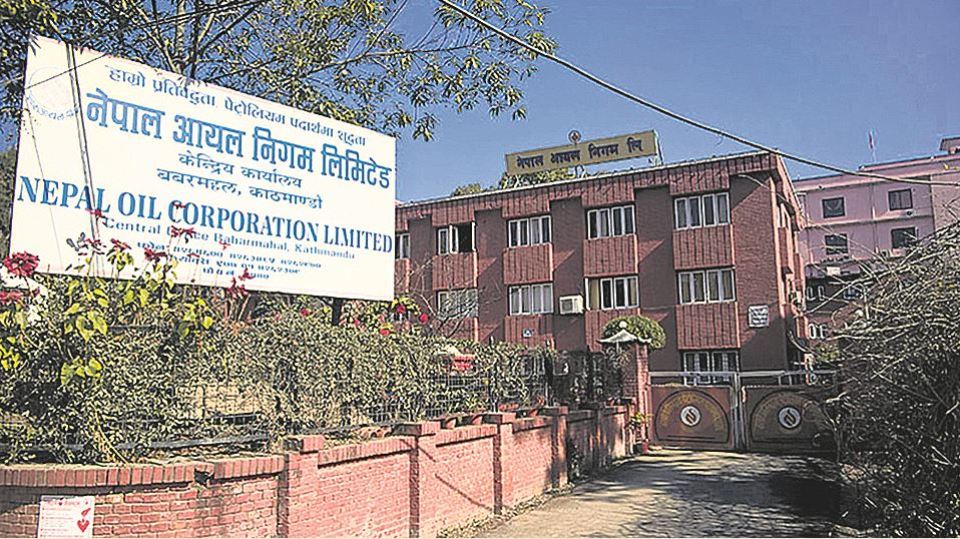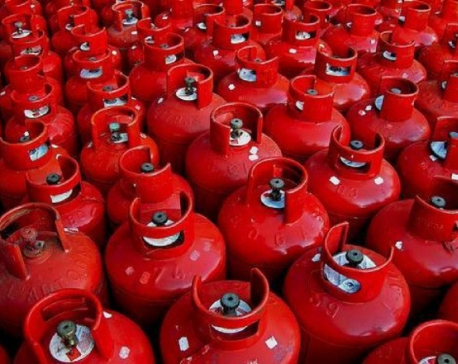
OR
NOC incurs monthly loss of Rs 10 billion
Published On: June 30, 2022 05:30 PM NPT By: Republica | @RepublicaNepal

KATHMANDU, June 30: While the prices of petroleum products are rising in the international market, Nepal Oil Corporation (NOC) is bearing a loss of Rs 10 billion monthly. According to the employees' union, the main reason for such a loss is the government's intervention.
Sandeep Baral, General Secretary of NOC Independent Employees Union and Javindra BK, General Secretary of NOC Employees Union (Official Trade Union) jointly handed over a letter to Minister for Industry, Commerce and Supplies Dilendra Prasad Badu on Wednesday urging him to solve the issue.
The government reduced the price of petrol and diesel a few days ago by promising to reduce taxes. Initially, the NOC had reduced the price of petrol and diesel by Rs 10 and last week by Rs 20 per liter for petrol and by Rs 29 for per liter of diesel. The union claimed that the Ministry of Finance is not positive about the tax reduction by Rs 30 per liter on petrol and Rs 39 per liter on diesel even though the government has promised to reduce the tax twice.
The letter states that the corporation incurred a loss of about Rs 32 billion in the last 14-15 months due to the lack of price adjustment as per the price hike in the international market. The due payment to be paid for the purchase of petroleum products from the Indian Oil Corporation (IOC) has reached Rs 22 billion. According to the rate set by the Reserve Bank of India, the NOC has to pay the IOC with about 12 percent interest.
Similarly, the Ministry of Finance has approved to take a loan of Rs 3 billion from Rastriya Banijya Bank by pledging 40 ropanis of land of the corporation located in Teku.
Likewise, the letter also states that the Ministry of Finance has been reluctant to return the Rs 7 billion that was overpaid due to advance income tax and value added tax till the end of the last fiscal year. They have complained that the government is not serious about resolving the financial crisis of the corporation.
You May Like This

NOC slashes price of petrol by Rs 7 per liter, diesel and kerosene by Rs 5 per liter
KATHMANDU, May 15: Nepal Oil Corporation (NOC) has announced a significant reduction in the prices of petrol, diesel and kerosene. Read More...

NOC incurs loss of Rs 47 billion in 10 months
KATHMANDU, May 23: Nepal Oil Corporation (NOC) incurred a loss of Rs 47 billion in the last 10 months. The... Read More...

NOC hikes prices of LPG gas cylinder by Rs 200 and petrol, diesel and kerosene by Rs 10 per liter
KATHMANDU, May 22: The government has hiked the prices of LPG gas cylinder by Rs 200 each cylinder and petroleum... Read More...











Just In
- Bangladesh protest leaders taken from hospital by police
- Challenges Confronting the New Coalition
- NRB introduces cautiously flexible measures to address ongoing slowdown in various economic sectors
- Forced Covid-19 cremations: is it too late for redemption?
- NRB to provide collateral-free loans to foreign employment seekers
- NEB to publish Grade 12 results next week
- Body handover begins; Relatives remain dissatisfied with insurance, compensation amount
- NC defers its plan to join Koshi govt







Leave A Comment